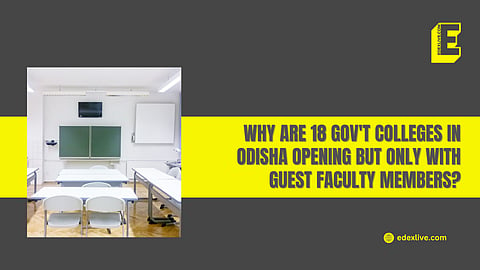

The 18 new government degree colleges in educationally backward districts, which was announced by the previous BJD government in January this year, will become operational in the new academic session.
However, teaching will be helmed by only guest faculty members and the colleges will operate from school buildings.
Besides, faculty members of different degree colleges will head these institutions as in-charge principals. The Higher Education department will operationalise the new degree colleges in 18 blocks of 10 educationally backward districts from the upcoming academic session of 2024-25, which begins on August 1, stated a report by The New Indian Express.
The colleges will come up in:
- Gumma (Gajapati)
- Dharakote (Ganjam)
- Thuamul Rampur (Kalahandi)
- Khajuripada (Kandhamal)
- Bandhugaon and Narayanapatna (Koraput)
- Chitrakonda (Malkangiri)
- Tiring (Mayurbhanj)
- Tentulikhunti, Kosagumuda, Jharigaon, Raighar (Nabarangpur)
- Kasipur, Ramanaguda, Chandrapur (Rayagada)
- Nuagaon, Gurundia, Kuarmunda (Sundargarh)
These 'educationally uncovered' blocks neither have any private or self-financing colleges. Each college will offer education in only Arts stream in five disciplines of Political Science, Education, History, English and Odia.
The students' strength will be 32 seats in each discipline.
But, as regular faculty recruitments to degree colleges have been put on hold since the last three years owing to the Supreme Court's stay on Odisha Universities (Amendment) Act, 2020, the department has decided to manage the affairs with just guest faculty members.
Accordingly, it will engage four guest faculty members per college. An official said, including the in-charge principal, there will be five faculty members for five disciplines in each of the colleges.
On the contrary, the faculty pattern for degree colleges as per the University Grants Commission (UGC) is three faculty members per subject.
Similarly, official sources said as there was little time available to look for land or rented buildings to operationalise the colleges, it was decided that they would function from school buildings in the block.
Albeit a temporary move, the arrangement will be in place till faculty members are appointed and land is identified for construction of new college buildings. Although academicians welcome the initiative to open degree colleges in educationally uncovered blocks, they termed it as a hurried move.
"There is no reason why 18 colleges should be opened in the remote corners of the state without basic infrastructure or manpower. Even if the disciplines are mostly non-practical subjects, this may be the only State where colleges are being opened with only guest faculty members," said Shibananda Tripathy, a retired principal.
